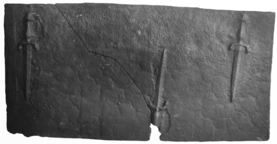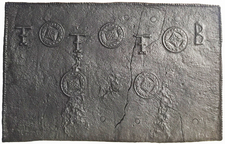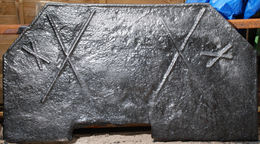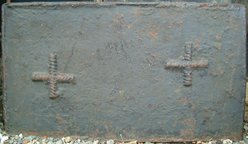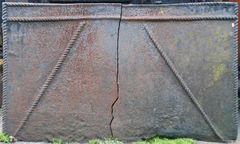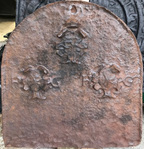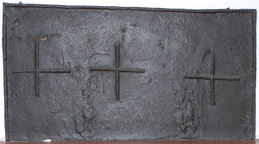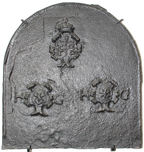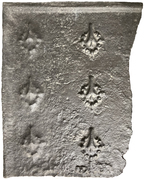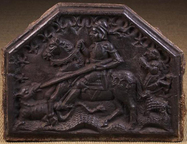-
1047
Description: Sub-rectangular shape, no edging; three impressions formed of a dagger (c.350mm) with fleur-de-lys terminals: two, at each end, with the handle uppermost, the other inverted lower right of centre.
Notes: The dagger (length approx. 39cm) can be described as a 'cross-hilt' or 'quillon' type, possibly of German origin (ex. inf. Tobias Capwell). The grouping of three daggers may also have apotropaic significance in relation to the Trinity. Formerly part of the J. H. Every collection.
- Decoration tags:
- rectangular (shape)
- none (edging)
- simple stamps
- apotropaic
- objects
Manufactured: in the 16th century in the Weald area of England.
Current location: Anne of Cleves House, Southover High Street, Lewes, East Sussex, England.
Museum number: LH000.920 (part of the Sussex Archaeological Society museum group)
- Attached to series:
- Knife & Dagger stamp firebacks
-
495
Description: Rectangular; twisted rope edging on top and sides; five stamps formed from a circular butter print with a diamond-shaped central element, divided in four, surrounded by a circular border with zig-zag pattern and a raised edge. The letters are interspaced with the top row of three stamps.
Notes: Butter prints were made of wood, and smaller than wafering irons. Formerly part of the J. H. Every collection.
Inscription: T T T B
- Decoration tags:
- rectangular (shape)
- rope (edging)
- simple stamps
- carved stamps
- individual letters
- text
- objects
Manufactured: in the 16th century in the Weald area of England.
Current location: Michelham Priory, Arlington, East Sussex, England.
Museum number: 1944.24.455 (part of the Sussex Archaeological Society museum group)
- Attached to series:
- Food mould stamp firebacks
-
602
Description: Canted rectangle; twisted rope edging (top and sides); roughly symmetrical arrangement of two large saltires formed of twisted rope inside and below the top corners, with two small saltires, also of rope, between the large ones and the lower ends of the canting.
Notes: The simple arrangement, while likely to be early, is difficult to date with any precision. Christie's Masters and Makers Sale, South Kensington, 30 Nov 2010, lot 532 (£500).
- Decoration tags:
- rectangular with canted top corners (shape)
- rope (edging)
- simple stamps
- apotropaic
- objects
Manufactured: in the 16th century possibly in the Weald area of England.
Current location: not known.
- Attached to series:
- Rope design firebacks
-
615
Description: Rectangular; twisted rope edging (top and sides); two irregularly spaced crosses formed of short, thick twisted lengths of rope.
Notes: The crosses may have been formed by twisting thinner rope around a short length of dowel, and are likely to have Christian significance.
- Decoration tags:
- rectangular (shape)
- rope (edging)
- simple stamps
- apotropaic
- objects
Manufactured: in the 16th century possibly in the Weald area of England.
Current location: Mark Ripley Forge & Fireplaces, Northbridge Street, Robertsbridge, East Sussex, England.
- Attached to series:
- Rope design firebacks
-
642
Description: Rectangular; twisted rope edging (top and sides); length of twisted rope parallel with, and equal to, top edge; length of rope, equal to side edge, repeated twice slanting from near top middle to bottom corners.
Notes: Very simple design using only two lengths of rope.
- Decoration tags:
- rectangular (shape)
- rope (edging)
- simple stamps
- objects
Manufactured: in the 16th century in the Weald area of England.
Current location: Mark Ripley Forge & Fireplaces, Northbridge Street, Robertsbridge, East Sussex, England.
- Attached to series:
- Rope design firebacks
-
1306
Description: Arch shaped; rope edging (top and sides); top centre, crowned cartouche with initials F S linked with twisted cord; below, two cartouches, each bearing a 7-pointed star, and each separating the paired initials HG.
Notes: The national origin of this fireback is a little uncertain. A variant of this fireback (no. 767) has slightly different proportions and relative positions of the stamps.
Inscription: F S / H G H G
- Decoration tags:
- rounded arched (shape)
- rope (edging)
- carved stamps
- heraldic
- text
Manufactured: in the 16th century possibly in the Lorraine area of France.
Current location: Ripley Forge & Fireplaces, Northbridge Street, Robertsbridge, Salehurst, East Sussex, England.
- Attached to series:
- Miscellaneous stamp firebacks
- Cord-linked initials firebacks
-
728
Description: Quasi-rectangular; twisted rope edging (top and sides); across the centre, three crosses formed of the repeated stamping of a length of twisted rope.
Notes: The edging appears to have been formed of the same length of rope. The crosses almost certainly have Christian significance.
- Decoration tags:
- rectangular (shape)
- simple stamps
- apotropaic
- objects
Manufactured: in the 16th century possibly in the Weald area of England.
Current location: Victoria & Albert Museum, Cromwell Road, Kensington & Chelsea, Greater London, England.
Museum number: 887.1901 (part of the Victoria & Albert Museum museum group)
- Attached to series:
- Rope design firebacks
-
767
Description: Arch shaped; rope edging (top and sides); top centre, slightly over-pressed crowned cartouche with initials F S linked with twisted cord; below, two cartouches, each bearing a 7-pointed star, and each separating the paired initials HG.
Notes: The national origin of this fireback is a little uncertain. A variant of this fireback (no. 1306) has slightly different proportions and relative positions of the stamps.
Inscription: F S / H G H G
- Decoration tags:
- rounded arched (shape)
- rope (edging)
- carved stamps
- heraldic
- text
Manufactured: in the 16th century possibly in the Lorraine area of France.
Current location: Victoria & Albert Museum, Cromwell Road, Kensington & Chelsea, Greater London, England.
Museum number: 888.1901 (part of the Victoria & Albert Museum museum group)
- Attached to series:
- Miscellaneous stamp firebacks
- Cord-linked initials firebacks
-
1067
Description: Fragment; rectangular shape; ovolo-moulded edging (top and sides); six stamps, in two columns of three, taking the form of a long-pointed arrow head within a circlet of small curls.
Notes: The stamps are of an unfamiliar type with some similarity to the heraldic symbol for ermine. Because only the left part of the fireback has survived it is not known how many original columns of this stamp there were.
- Decoration tags:
- rectangular (shape)
- ovolo (edging)
- carved stamps
- heraldic
Manufactured: in the 16th century possibly in the Weald area of England.
Current location: Victoria and Albert Museum, Cromwell Road, Kensington and Chelsea, London, England.
Museum number: M.148-1915 (part of the Victoria & Albert Museum museum group)
- Attached to series:
- Miscellaneous stamp firebacks
-
1146
Description: Canted rectangular shape; astragal edging with repeated fleurs-de-lys inside top and side edges; figure of St George impaling a dragon to the left with a lance over an undulating ground, with a kneeling figure above a sheep to the right.
Notes: The mould for this unusual fireback may have been formed using a redundant carved, medieval wooden panel, perhaps from a church. Wilkinson's Auctioneers, Doncaster, 24 June 2018, lot 132.
- Decoration tags:
- rectangular with canted top corners (shape)
- astragal (edging)
- whole carved pattern
- pictorial
- mythological
- animals
- humans
Manufactured: in the 16th century in England.
Current location: not known.
- Attached to series:
- Miscellaneous pattern firebacks
